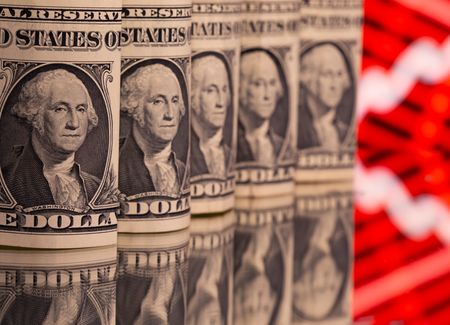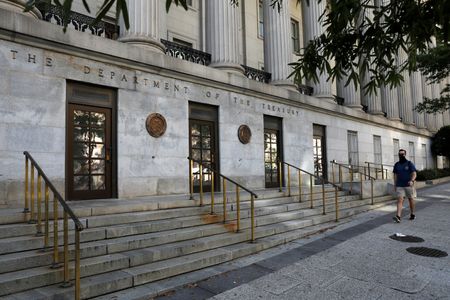 1
1 1
1


NEW YORK (Reuters) – Net foreign inflows into Treasuries rose for a third straight month in January in the amount of $74.36 billion, data from the U.S. Treasury department showed on Tuesday.
Private overseas investors bought $62.22 billion in Treasuries and foreign official institutions bought $12.29 billion in January, according to Treasury International Capital (TIC) data.
Foreigners have bought Treasuries in eight of the last 12 months, including a record net monthly purchase of $118 billion in March 2021.
Overall, the data showed a net TIC inflow of $294.2 billion. Of this, net foreign private inflows were $270.8 billion, and net foreign official inflows were $23.4 billion.
But total foreign holdings actually fell, as yields rose.
U.S. benchmark 10-year Treasury yields peaked at 1.9020% in January and ended the month at 1.7838%, up about 27 basis points from the end of December.
The yield on the two-year note rose to 1.1846% in January from 0.7341% as markets anticipated a Federal Reserve interest rate hike to slow price rises and stave off hotter inflation.
The Fed is expected to raise its policy rate on Wednesday by 0.25%, the first hike since 2018, and announce it had ended pandemic-era bond purchases, with an aim to start letting its massive balance sheet shrink. Several more rate hikes are expected this year and next.
Foreign holdings of Treasury securities fell to $7,662 trillion from $7,747 trillion, led by custodian locations such as the United Kingdom, Belgium, Ireland and Luxembourg.
If a U.S. Treasury security purchased by a foreign resident is held in a custodial account in a third country, the true ownership of the security will not be reflected in the
data.
“It does show you that a lot of foreign investors were selling their Treasury holdings during the month, said Gennadiy Goldberg, senior U.S. rates strategist at TD Securities, who added that it was consistent with the sell-off in Treasuries during the month.
Japan’s holdings of Treasury securities fell by just under $1 billion to $1.303 trillion in December although it remained the largest non-U.S. holder of Treasuries.
China, the second largest holder of Treasuries, saw its holdings decline to $1.060 trillion from $1.068 trillion in December.
“That’s consistent with the really big jump in rates that we saw early in the year just on expectations of stronger global economic growth and potentially more hawkish central banks,” said Goldberg. “So the data certainly matches the price action fully at the start of the year.”
In other asset classes, U.S. corporate bonds, posted an inflow of $7.62 billion in January, reversing December’s net outflow of $4.02 billion.
(Reporting by Alden Bentley; Editing by David Gregorio)